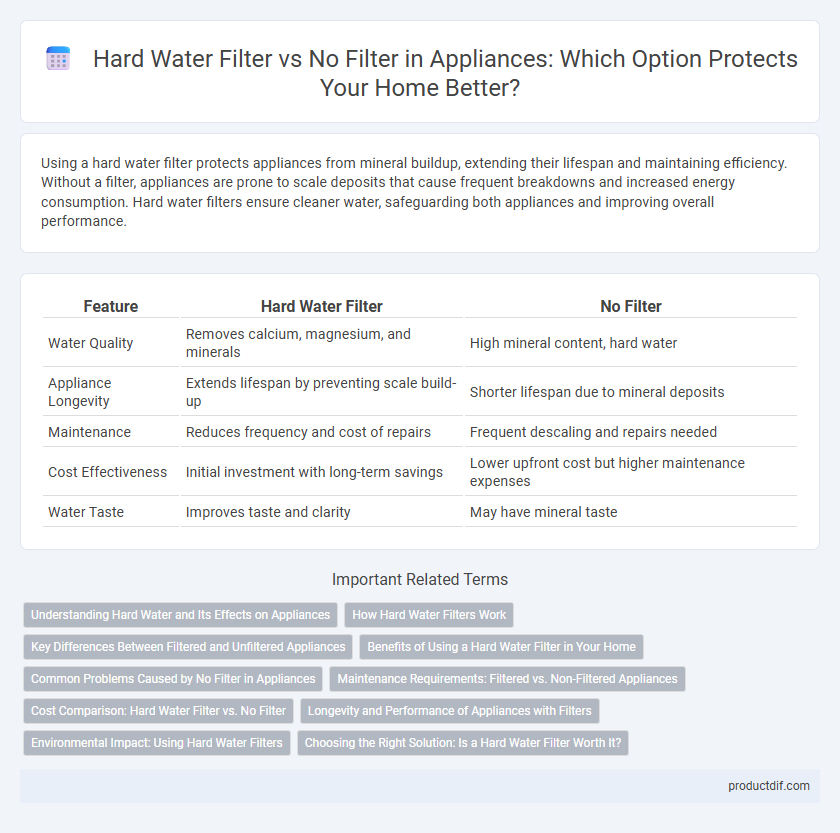Using a hard water filter protects appliances from mineral buildup, extending their lifespan and maintaining efficiency. Without a filter, appliances are prone to scale deposits that cause frequent breakdowns and increased energy consumption. Hard water filters ensure cleaner water, safeguarding both appliances and improving overall performance.
Table of Comparison
| Feature | Hard Water Filter | No Filter |
|---|---|---|
| Water Quality | Removes calcium, magnesium, and minerals | High mineral content, hard water |
| Appliance Longevity | Extends lifespan by preventing scale build-up | Shorter lifespan due to mineral deposits |
| Maintenance | Reduces frequency and cost of repairs | Frequent descaling and repairs needed |
| Cost Effectiveness | Initial investment with long-term savings | Lower upfront cost but higher maintenance expenses |
| Water Taste | Improves taste and clarity | May have mineral taste |
Understanding Hard Water and Its Effects on Appliances
Hard water contains high levels of calcium and magnesium minerals that cause scale buildup inside appliances, leading to reduced efficiency and shorter lifespan. Using a hard water filter significantly minimizes mineral deposits, protects heating elements, and improves appliance performance, especially in washing machines, dishwashers, and water heaters. Without a filter, the accumulation of limescale results in increased energy consumption, frequent repairs, and potential appliance failure over time.
How Hard Water Filters Work
Hard water filters use ion exchange resin beads to remove calcium and magnesium ions responsible for water hardness, replacing them with sodium or potassium ions, which prevents scale buildup in appliances. These filters also employ activated carbon to reduce chlorine, sediment, and other impurities, improving water taste and appliance longevity. Without a filter, hard water causes mineral deposits that reduce appliance efficiency and lifespan, leading to increased maintenance costs.
Key Differences Between Filtered and Unfiltered Appliances
Appliances with hard water filters prevent mineral buildup, extending lifespan and improving efficiency by reducing scale formation on heating elements. Unfiltered appliances suffer from accumulation of calcium and magnesium deposits, leading to higher energy consumption and frequent maintenance. Filtered machines also enhance water taste and protect internal components, ensuring consistent performance over time.
Benefits of Using a Hard Water Filter in Your Home
Using a hard water filter in your home significantly reduces mineral buildup in appliances, extending their lifespan and improving efficiency. It enhances water quality by minimizing scale formation, which protects plumbing systems and prevents clogging. Softened water also improves soap and detergent effectiveness, leading to cleaner dishes, laundry, and healthier skin.
Common Problems Caused by No Filter in Appliances
Appliances exposed to hard water without a filter often suffer from mineral buildup, leading to clogged pipes and reduced efficiency. This scale accumulation shortens the lifespan of water heaters, washing machines, and dishwashers, causing frequent breakdowns and higher maintenance costs. Hard water deposits also impair appliance performance by reducing water flow and increasing energy consumption.
Maintenance Requirements: Filtered vs. Non-Filtered Appliances
Appliances with hard water filters require regular filter replacement and cleaning to maintain optimal performance and prevent limescale buildup, which can extend the appliance's lifespan. Non-filtered appliances face frequent descaling and potential component damage due to mineral deposits, resulting in higher maintenance efforts and costs. Proper filter maintenance reduces the risk of clogs, ensures energy efficiency, and minimizes repair frequency compared to appliances without water filtration.
Cost Comparison: Hard Water Filter vs. No Filter
Installing a hard water filter typically involves an initial investment ranging from $100 to $500, plus maintenance costs averaging $50 to $150 annually, while avoiding potential damage to appliances and plumbing systems. Without a filter, households may save on upfront expenses but face higher long-term costs due to scale buildup causing increased energy consumption, frequent repairs, and shorter appliance lifespans, potentially exceeding hundreds of dollars per year. Evaluating these factors, hard water filters offer cost savings by preventing mineral buildup-related damages and improving appliance efficiency over time.
Longevity and Performance of Appliances with Filters
Appliances equipped with hard water filters experience significantly enhanced longevity by preventing mineral buildup that causes clogs and corrosion. These filters maintain optimal appliance performance, reducing energy consumption and ensuring consistent water flow. In contrast, appliances without filters face accelerated wear and frequent maintenance issues due to scale deposits, ultimately shortening their lifespan.
Environmental Impact: Using Hard Water Filters
Using hard water filters significantly reduces the environmental impact by minimizing scale buildup in appliances, which extends their lifespan and decreases energy consumption. These filters prevent increased detergent and chemical usage needed to combat hard water effects, reducing water pollution and chemical waste. Without filters, increased appliance wear and higher energy requirements contribute to greater carbon emissions and environmental degradation.
Choosing the Right Solution: Is a Hard Water Filter Worth It?
A hard water filter reduces mineral buildup and extends appliance lifespan by removing calcium and magnesium from water. Without a filter, appliances face scale accumulation, leading to decreased efficiency and costly repairs. Evaluating water hardness levels and appliance sensitivity helps determine if investing in a hard water filter is financially and functionally beneficial.
Hard Water Filter vs No Filter Infographic

 productdif.com
productdif.com